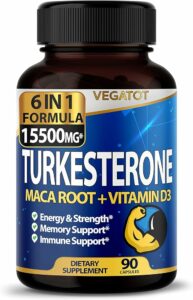Cinnamon offers various benefits, such as its anti-inflammatory and antioxidant properties. It also helps regulate blood sugar levels, reduce the risk of heart disease, and improve brain function.
Cinnamon is a spice derived from the inner bark of trees belonging to the Cinnamomum family. Aside from adding a delightful flavor to dishes, this aromatic spice offers numerous health benefits. One of the major advantages of consuming cinnamon is its ability to combat inflammation due to its anti-inflammatory properties.
Its high levels of antioxidants also make it an excellent option for reducing free radicals in the body and protecting against oxidative stress. Additionally, cinnamon has been shown to aid in regulating and stabilizing blood sugar levels, making it a valuable spice for those with diabetes or insulin resistance. Moreover, studies have suggested that cinnamon can help lower cholesterol, reduce the risk of heart disease, and improve cognitive function. With its wide range of health benefits, cinnamon is a versatile and valuable addition to any diet.
Table of Contents
Why Cinnamon Is Essential For Your Health
The benefits of cinnamon go beyond just its delicious flavor. This powerful spice is essential for your overall health and well-being. One of the key benefits of cinnamon is its ability to boost the immune system. Cinnamon is packed with antioxidants and has anti-inflammatory properties, which can help strengthen your body’s defenses against infections and diseases. It can also help reduce the risk of chronic diseases such as heart disease and diabetes. Additionally, cinnamon has been found to improve blood sugar control, making it a valuable tool for managing diabetes. Incorporating cinnamon into your diet is easy – sprinkle it on your morning oatmeal, add it to your coffee, or mix it into a smoothie. Enjoy the many benefits of cinnamon and support your health naturally.
Cinnamon’s Role In Boosting Immunity
Cinnamon has been revered for its immune-boosting properties for centuries. Adding it to your daily routine can have a significant impact on your immune system’s function.
Cinnamon is rich in antioxidants and antiviral compounds, which help strengthen the body’s defense mechanisms. These antioxidants combat the harmful effects of free radicals, reducing inflammation and cell damage. Its antiviral properties can prevent and fight against various infections and diseases, including the common cold and flu.
| Benefits of Cinnamon for Balancing Blood Sugar | Benefits of Cinnamon for Anti-Inflammatory | Benefits of Cinnamon for Cognitive Function |
| Cinnamon helps regulate blood sugar levels, making it beneficial for individuals with diabetes or insulin resistance. | Cinnamon’s anti-inflammatory properties can help reduce inflammation in the body, alleviating symptoms of conditions like arthritis. | Studies have shown that cinnamon can improve cognitive function and memory, making it a valuable tool for brain health. |
Including cinnamon in your diet is easy. Sprinkle it over your morning oatmeal or add it to your favorite baked goods for a delicious and nutritious boost to your immune system.
Enhancing Well-being With Cinnamon
Cinnamon has been used for centuries due to its various health benefits. One of its key roles is reducing inflammation in the body, making it an ideal natural remedy for those dealing with chronic inflammatory conditions such as arthritis. Its anti-inflammatory properties can help alleviate pain and discomfort, improving overall well-being.
In addition to reducing inflammation, cinnamon is also known for its positive effects on digestive health. It can aid in digestion by stimulating enzymes and reducing gastric discomfort, making it particularly useful for those suffering from digestive issues such as indigestion, bloating, and gas.
Moreover, cinnamon has been found to have antimicrobial properties that can help combat harmful bacteria and fungi in the digestive system, promoting a healthy gut flora. This can lead to improved digestion, nutrient absorption, and overall gut health.
Overall, incorporating cinnamon into your daily routine can have a multitude of health benefits, ranging from reducing inflammation to improving digestive health. Whether consumed in the form of a warm beverage or sprinkled on dishes, its natural properties can contribute to an enhanced sense of well-being.
Cinnamon’s Antioxidant Properties
Cinnamon is not only a delicious spice, but it also offers powerful health benefits, thanks to its antioxidant properties. Antioxidants are compounds that help protect the body’s cells from damage caused by harmful free radicals.
Research has shown that cinnamon is packed with antioxidants, which can help reduce oxidative stress and inflammation in the body. These antioxidants help neutralize free radicals, preventing them from causing damage to our cells and DNA.
Furthermore, cinnamon contains specific antioxidants, such as polyphenols, that have been linked to various health benefits. These polyphenols can help lower the risk of chronic diseases, including heart disease and certain types of cancer.
By incorporating cinnamon into your diet, you can take advantage of its antioxidant effects and help protect your cells from damage. Whether you sprinkle it on your morning oatmeal, brew it in a cup of tea, or use it in your favorite recipes, cinnamon is a flavorful addition with numerous health benefits.
Managing Blood Sugar Levels With Cinnamon
Cinnamon has been shown to have numerous benefits when it comes to managing blood sugar levels. Its impact on insulin sensitivity is particularly noteworthy. Studies have indicated that cinnamon can enhance insulin sensitivity in people with insulin resistance, which is a condition commonly associated with type 2 diabetes. By improving insulin sensitivity, cinnamon helps the cells in our bodies become more responsive to insulin, leading to more efficient uptake of glucose from the bloodstream.
In addition to improving insulin sensitivity, cinnamon also plays a role in reducing blood sugar spikes after meals. It contains compounds that can slow down the digestion of carbohydrates, resulting in a more gradual release of glucose into the bloodstream. This can help prevent sudden blood sugar spikes, which can be harmful, especially for individuals with diabetes.
Furthermore, cinnamon has been found to have antioxidant and anti-inflammatory properties, both of which are beneficial for overall health. Antioxidants help protect our cells against damage caused by harmful molecules called free radicals, while reducing inflammation can help lower the risk of chronic diseases like heart disease and diabetes.
Cinnamon As A Heart-healthy Spice
Cinnamon, a heart-healthy spice, offers numerous benefits. It helps reduce cholesterol, regulate blood sugar levels, and improve overall heart health.
Cinnamon has been recognized for its positive effects on heart health. One of the key benefits of cinnamon is its ability to assist in reducing cholesterol levels. Research studies have shown that cinnamon can help in lowering both total cholesterol and bad LDL cholesterol. Its active compounds, like cinnamaldehyde and cinnamic acid, have been found to inhibit the accumulation of fat and cholesterol in the bloodstream.
Moreover, cinnamon also plays a role in improving blood circulation and reducing the risk of blood clots. It promotes healthy blood flow by relaxing the blood vessels, which can ultimately benefit heart health. In addition, cinnamon possesses anti-inflammatory properties that help in reducing inflammation in the body, including the arteries.
Incorporating cinnamon into your daily diet is a simple and natural way to support heart health. Whether sprinkled on oatmeal or added to a cup of tea, cinnamon can be a delicious and beneficial addition to your routine. So why not reap the benefits of this heart-healthy spice today?
Cinnamon For Brain Health And Cognitive Function
The cognitive benefits of consuming cinnamon are numerous and significant. Research suggests that cinnamon has the potential to improve brain health and enhance cognitive function. One of the key advantages of cinnamon is its ability to reduce the risk of neurodegenerative diseases such as Alzheimer’s and Parkinson’s.
Cinnamon contains compounds that have been found to inhibit the buildup of tau protein and reduce inflammation in the brain, which are associated with neurodegenerative conditions. Furthermore, cinnamon has been shown to enhance memory and improve overall cognitive performance. It may also help with attention, focus, and concentration.
Additionally, cinnamon has antioxidant properties that can protect brain cells from damage caused by free radicals. Its anti-inflammatory effects can also help to decrease inflammation in the brain, which is believed to play a role in cognitive decline.
Incorporating cinnamon into your diet is a simple and delicious way to support brain health and cognitive function. Whether added to your morning coffee, sprinkled on oatmeal, or used in baking, cinnamon offers a natural and beneficial boost to your brain power.
Incorporating Cinnamon Into Your Daily Routine
Cinnamon is not only a popular spice used in cooking and baking, but it also offers a range of health benefits. Incorporating cinnamon into your daily routine can enhance your overall well-being.
Delicious Ways To Include Cinnamon In Your Diet
Adding cinnamon to your meals or drinks is a delightful way to enjoy its unique flavor and reap its health benefits.
| Food Items | Suggestions |
|---|---|
| Breakfast | Sprinkle cinnamon on oatmeal, yogurt, or smoothie bowls. |
| Beverages | Stir cinnamon into your coffee, tea, or hot chocolate for a warm and inviting flavor. |
| Baking | Add cinnamon to your favorite breads, muffins, or pastries for an aromatic and tasty twist. |
| Desserts | Sprinkle cinnamon on fruits, like apples or bananas, or use it as a topping for ice cream or pudding. |
Recommended daily intake of cinnamon for optimal health may vary depending on individual needs. However, a general guideline suggests consuming up to 1-2 teaspoons of cinnamon per day.
With its versatility and a hint of sweetness, cinnamon can easily be incorporated into your everyday meals and treats, ensuring you enjoy its numerous health benefits.
Potential Side Effects And Precautions
Cinnamon is generally considered safe for consumption, but there are some precautions to keep in mind when using it as a supplement.
- Allergy: Some individuals may be allergic to cinnamon. If you experience any allergic reactions such as skin rash, itching, or difficulty breathing, discontinue use immediately and seek medical attention.
- Blood sugar control: Cinnamon can lower blood sugar levels. If you have diabetes or are taking medication to control your blood sugar, consult with your healthcare provider before incorporating cinnamon into your routine. Regular monitoring of blood sugar levels is recommended.
- Liver health: High doses of cinnamon, particularly the coumarin compound found in Cassia cinnamon, may have negative effects on the liver. Individuals with liver disease or taking medications that affect liver function should use cinnamon with caution.
- Interactions with medications: Cinnamon may interact with certain medications, such as blood thinners. It’s important to talk to your doctor or pharmacist to ensure that cinnamon will not interfere with any medications you are currently taking.
- Pregnancy and breastfeeding: Limited research is available on the effects of cinnamon during pregnancy and breastfeeding. It is always recommended to consult with a healthcare professional before using any supplements or herbs during these periods.
Overall, while cinnamon offers numerous benefits, it is essential to be aware of these precautions and potential risks. If in doubt, consult with a healthcare professional to ensure safe and appropriate use of cinnamon as a supplement.

Credit: www.everydayhealth.com
Frequently Asked Questions Of The Benefits Of Cinnamon
What Are The Health Benefits Of Cinnamon?
Cinnamon offers a range of health benefits, including its ability to lower blood sugar levels, reduce inflammation, fight against bacterial and fungal infections, improve digestion, and boost cognitive function. Its antioxidants also play a role in reducing the risk of chronic diseases like heart disease and cancer.
How Can Cinnamon Help With Weight Loss?
Cinnamon can aid in weight loss by increasing metabolism, stabilizing blood sugar levels, and suppressing appetite. It helps to regulate insulin levels, which can prevent fat storage and promote the breakdown of fats. Adding cinnamon to your diet can support your weight loss efforts and promote a healthy metabolism.
Is Cinnamon Beneficial For Heart Health?
Yes, cinnamon has been shown to have positive effects on heart health. Its anti-inflammatory and antioxidant properties can help reduce the risk of heart disease by lowering LDL cholesterol levels and triglycerides. It also helps to improve circulation and reduce blood pressure, both of which are vital for maintaining a healthy heart.
Can Cinnamon Help Manage Diabetes?
Cinnamon has been found to improve insulin sensitivity, which is crucial for individuals with diabetes. It can lower blood sugar levels by mimicking the effects of insulin and enhancing the uptake of glucose by cells. Adding cinnamon to your meals or beverages can be a beneficial strategy for managing diabetes.
Conclusion
To sum up the benefits of cinnamon, this spice not only adds a warm and comforting flavor to foods but also provides numerous health advantages. From its powerful anti-inflammatory and antioxidant properties to its potential in managing blood sugar levels and boosting brain function, cinnamon is truly a superfood.
Incorporating this versatile spice into your diet can have a positive impact on your overall well-being. So go ahead and sprinkle some cinnamon on your favorite dishes and reap the rewards it offers.








